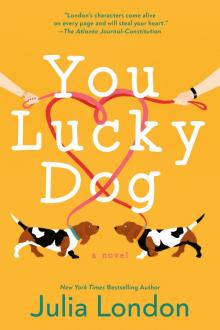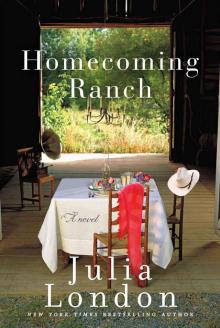- Home
- Julia London
Return to Homecoming Ranch (Pine River) Page 4
Return to Homecoming Ranch (Pine River) Read online
Page 4
“Yeah,” Madeline said, nodding as if she was worried, too. “I’ve been thinking a lot about it.”
Libby did not like it when Madeline had been thinking. Usually it meant she was thinking about why things wouldn’t work, as opposed to how to make them work. “I think we should get a loan,” Libby blurted before Madeline could suggest something she did not want to hear.
“Huh?” Madeline said, startled.
The thought sort of startled Libby, too. “A loan. You know, to spruce things up and tide us over until we can get some events booked.”
Madeline was already shaking her head. “I don’t think that’s a good idea. You have to have a way to pay them back—”
“We could get a business loan,” Libby said quickly. She knew that’s what Leslie Brown had done when she opened up her salon in town. If Leslie could do it, so could they.
But Madeline looked shocked by the suggestion.
“I’m just saying we should at least talk to the bank, Madeline. We can’t make any gains without a little risk. Or without fixing the place up. Or without marketing ourselves, right?”
“But we’re leaking money, Libby. It seems to me the last thing we want to do is leak more money. How would we pay it back? And Emma would never sign off—”
“Don’t worry about Emma,” Libby said. She did enough worrying about Emma for the both of them, and besides, that was a bridge she would cross when she came to it.
“Okay, sure, we won’t worry about Emma,” Madeline said, calling her bluff. “She owns as much of this ranch as we do, but we won’t worry about that because she’s sooo predictable.”
That was true—Emma was a loose cannon, a chess piece that had fallen off the board. “Look, all I’m saying is that if we had some money to advertise our place, and to make it so people will want to come here, we might get enough business so that we aren’t leaking money. I figure we need at least six events a year just to break even.”
“I don’t know,” Madeline said with a shake of her head. “We have no tangible reason to borrow.”
“Right now, we’re just talking about it.”
Madeline bit her lower lip. “Okay,” she said. “As long as we’re just talking about it. I’m going to go get the bowls.” She walked out of the kitchen, ending the conversation.
Madeline didn’t say more about it. She came back to the kitchen with the bowls and talked about what she’d done in town that day, glossing over the conversation about the ranch. In Libby’s mind, Madeline was always glossing over things. She wondered if Madeline truly feared setting her off into some manic explosion.
To be fair, Libby sometimes feared it, too. She still couldn’t wrap her head around what she’d done. It was so unlike her, so unlike how she’d ever been. The little green pills she took each day were supposed to keep her calm and even-tempered, and Libby supposed they did. She felt fine. Almost normal. Her explosion of anger at Ryan’s truck and, according to Dr. Huber, her very loud and very vile shouting, had come after several days of not sleeping or eating, of trying to sort things out in her head. That afternoon, after it happened, Libby had felt as if she were standing at the end of a very long tunnel. She could hear voices of people around her, but the voices had not seemed real. In fact, to this day, Libby still wasn’t sure if they’d been real.
Maybe Madeline remembered more of that afternoon than Libby did. Maybe that’s why she tried so hard not to upset Libby. Someday, maybe Libby would ask Madeline—when she thought she could bear to hear all the details.
When Madeline left a half hour later, Libby walked into the living room and stepped around four dogs, who were arranged in various poses of canine rest. She watched the taillights of Madeline’s SUV bump down the drive.
When the lights disappeared, Libby stared out into the early evening, picturing Gwen in the kitchen of the house where Libby had lived with Ryan and the kids. She could imagine Gwen using the old, red Dutch oven to make dinner—six-year-old Max loved lasagna, and eight-year-old Alice loved pizza—while she told Ryan about her run-in with his ex-girlfriend.
She wondered how Ryan looked as he heard about it. Did he squirm just a little? Did he think back to his own encounter with Libby earlier this week in the parking lot of the grocery store? It had been an awkward moment—Libby hadn’t seen him, not until she happened to look up, and there he was, walking toward her, his head down, too. They’d both stopped. “Hey,” he’d said. “How are you, Libby?”
What was she supposed to say to that? Miserable. Crazy. But of course you know that. “Fine,” she’d said.
And then she had realized she was standing too close to him, that she was in violation of her restraining order. She’d started to walk away, but Ryan had said, “I’m sorry, Libby.”
That had stopped her in her tracks. “Huh?”
“I’m sorry,” he’d said again, and damn it if he hadn’t looked sorry. “About what happened between us.”
Libby had been so surprised that she couldn’t quite grasp what he was apologizing for. “I have to go,” she’d said, as if that weren’t obvious, and she’d hurried away, that damn restraining order on her mind.
But since then, she’d wondered what he meant. Was he saying he’d made a mistake? Or did he tell Gwen about it that night, the two of them laughing at how she’d fled?
Libby was reminded of one snowy night early last winter, when she’d been in the kitchen where Gwen was now. She was making cinnamon rolls, and Alice was twirling around in her little dance shoes, telling some convoluted story of a princess. Libby remembered the way Ryan had looked at his daughter, and then at Libby. He’d said, “You are so good with them. God, I love you, Libby.”
That was a year ago. One lousy year.
Sometimes, when Libby thought of Ryan, she had that same, disembodied, numb feeling she’d had the afternoon she’d taken a golf club to his truck. Sometimes, she feared that she was sinking into anger again, losing her objectivity.
The sound of her phone ringing startled her. She hurried back into the kitchen where she’d left it, vaulting over a dog, and grabbed it up from the counter. She smiled when she saw the display and answered it. “Hi, Alice. What are you doing?” she asked, and with the phone to her ear, began to tidy up while Alice talked about dance class.
FIVE
A couple of sun-drenched days later, Libby drove into Pine River. Thankfully, she’d been very busy since the day she’d stopped at the soccer fields and hadn’t had time to dwell on it. She’d mowed the lawn at the ranch with an ancient mower. She’d painted the gazebo, a much bigger job than she’d realized. But that had kept her mind on tasks that had to be done for the civil union ceremony of Austin and Gary, and today, she had things to do and people to see, not to mention lunch with her mother.
She had every intention of driving past the back entrance road into the subdivision where Ryan and Gwen lived. Every intention. But as she neared that road, she couldn’t stop herself from turning in, from driving by Ryan’s house. She never knew what she was looking for—some signal that there was trouble in paradise? That it wasn’t perfect? Or was she looking for signs of perfection, of a happy family that didn’t include her? Why did she even do that to herself?
That was a problem of late—she could never seem to stop herself from doing it.
Libby turned in and cruised around the winding streets up the hill to where the Spangler house sat, a sentry over the other, similar-looking Craftsman houses. When Libby lived here, she’d thought the house looked cozy and homey, but today, it didn’t look so special. It was in need of paint, which Libby had mentioned to Ryan more than once. Max’s Razor scooter was in the yard, just asking to be stolen. There was a bench beside the front door, shoes in various sizes piled next to it.
Sloppy.
The house had a big backyard that was perfect for the dog she’d let the kids get. It had a front porch and a bed of roses just below the porch railing. Two chimneys, one in the living room and one in the playroom,
faced each other from either end of the house.
Libby had once loved this house.
She hated it now. It almost sickened her to look at it, the place where she’d once belonged, where she’d once put all her hope for a bright future with a big family. It was like looking at the worst car wreck—she couldn’t turn away.
She rolled to a stop across the street from the house. Gwen’s Subaru was in the drive, next to Ryan’s truck. What was he doing home from work at ten in the morning? Sex? A shudder of revulsion ran down her spine. Ryan was always so horny in the morning. Gwen had probably strutted around in some shorty shorts and a cute, tight T-shirt with a funny saying, knowing that Ryan would pull her back into bed.
He used to do that to Libby. There was a time he couldn’t keep his hands off of her, when he would tell her she was beautiful and he loved her. When had he stopped doing that?
She stared at the house.
She wouldn’t be here now if he hadn’t talked to her in the parking lot of Safeway. Libby debated going up to the door. But that would be truly crazy of her.
Or would it?
Maybe Ryan meant what he’d said, that he’d made a mistake. Maybe he wished he could take it all back. Maybe he needed an opportunity to grovel as he asked her to forgive him, which, of course, Libby would not do. At least she didn’t think she would.
Better still, maybe Alice would come to the door.
Before she could decide, however, the garage door began to slide up. “Shit,” she whispered, and tried to start her car, but as usual, the junker wouldn’t turn over on the first attempt. As Ryan walked out onto the drive, she got it to catch and hit the gas. The damn thing puttered and spit before picking up enough speed for her to pull away from the curb. She sped down the quiet residential street with her heart pounding, ignoring the old woman walking her dog who shouted at her to slow down.
She turned recklessly onto the main road and headed into Pine River. She relaxed a little, but then happened to look in her rearview mirror. Ryan’s truck had just turned onto the road and he was barreling after her.
With a squeal, Libby careened into the parking lot of a convenience store. She slid down in the seat as far as she could go hoping that Ryan would drive by. But the sound of his truck rumbled in behind her, and she winced. She grabbed her wallet, her mind whirling around what she’d say, how she’d explain sitting out front of his house.
She saw him in the side view mirror, walking up to her car. Her view was of his midsection, and she had the wild thought that he looked like he’d gained a little weight. Reconciliation with Gwen had given handsome Ryan Spangler a gut.
He tapped on her window and motioned impatiently for her to roll it down. Libby didn’t roll the window down—she climbed over the console and popped out the passenger side, putting her little car between them—just in case—and looked at her ex-lover across the hood of her car. Damn it, why did she feel that old fluttering in her belly? It was infuriating—Ryan Spangler did not deserve even the slightest bit of fluttering.
He was frowning at her, his dark brown eyes full of irritation. He had a small scar across one brow, the result of a couch jump he didn’t execute well when he was twelve, that turned red when he was angry. How many times had she touched that scar?
Ryan sighed. “What the hell was that, Libby?” he demanded. “Are you stalking me now?”
“What? No!” she said, as if that were preposterous instead of perhaps a bit true. “Get over yourself, Ryan.”
“What if Gwen had seen you? Or the kids?” He groaned, removed his hat, and ran his palm over the crown of his blond hair. “Look, I’m really trying to do this right.”
“Do what right?”
He looked at her, his gaze sliding over her like it used to. “Libby, I’m sorry,” he said, and put his hand to his chest. “I am really sorry.”
Her heart skipped; it was the grocery store parking lot all over again. It was an apology, a wistful look. But the first time, she’d run from it, concerned about the restraining order, afraid that it was really more rejection wrapped up in a pretty apology.
But there was something about Ryan’s expression that made her step around the back of the car and move toward him, her eyes locked on his. She heard a car drive up behind her, but ignored it. “What are you trying to say, Ryan?” Say it. Say you are a sleaze and you wronged me and I deserve so much better than you.
“What am I saying? That I am sorry about everything.” His gaze drifted to a point over her shoulder. “Glad you’re here, Sam.”
Libby’s heart plummeted. She risked a look behind her; Sam was standing there, the door to his patrol truck still open. He arched a brow, silently questioning her.
Libby despised him in that moment—his timing was awful.
“Ryan?” Sam said, and his gaze shifted to Ryan. “Is everything okay here?” He asked it casually, strolling up to them as if they had all met here to have a drink. But he had one hand on the gun he wore on his belt. His hat, Libby noticed, was turned around, so that the bill was in back, and his hair was brushed back beneath it. He was wearing a departmental polo shirt tucked into jeans, the sun glinting off the badge he’d clipped to his pocket.
Ryan sighed wearily. “She’s stalking my house,” he said. He didn’t sound particularly angry, just matter of fact. His eyes were soft, almost sad, and Libby realized the breath she was holding was actually a sigh of longing. There was something about his eyes that had always gotten to her. Good God, what was wrong with her? He, of all people, didn’t deserve the slightest bit of longing from her. What he deserved was a good kick in the ass.
“That true, Libby?” Sam asked.
“No! I wasn’t stalking you, Ryan,” she said, unwilling to look at Sam, honestly uncertain if what she had done constituted stalking. Was driving by his house stalking? Or did stalking begin the moment she pulled over? At that moment, however, her heart was beating too fast for her to think clearly. “I was passing through. It’s a shortcut, you know that.”
Ryan gave her a look that said he knew the opposite was true.
Sam shifted to stand before her, which forced her to look at him. His hazel eyes, she noticed, did not look happy.
“You’re supposed to stay three hundred yards away from me, Libby. We just had this reminder two days ago,” Ryan said.
“I wasn’t within three hundred yards of you two days ago,” she pointed out. “And I can drive on any road I want to.”
“But can she stop and stare at my house?” Ryan asked Sam.
“Ryan, for heaven’s sake!” Libby protested. “I was driving by. Cutting through!”
His brown eyes narrowed. “I don’t believe you.”
She wasn’t going to win, and Libby was on the verge of admitting it, her thoughts whirling around why she had driven by his house—surmising that wanting to see Ryan grovel would probably not fly with anyone here—when Sam said, “I think this time, it’s true.”
What did he just say? Libby jerked her gaze to Sam.
“She’d agreed to meet me here and she was probably running late.”
“Meet you?” Ryan asked. “Why?”
Libby also wanted to hear that answer.
“Because she’s helping me out with some less fortunate folk.” Sam stared down at Libby, his gaze full of warning not to contradict him. “You know how she is, always willing to help others.” He gave Ryan a pointed look.
Ryan looked a little flustered by that. “Well,” he said uncertainly. He studied Libby a moment. And then, for the first time in months, he smiled at her. He propped his arms on the hood of her car and said, “Listen, Lib. I know this has been really hard for you. I get that, I do. Honest to God,” he said, clamping a hand over his heart. “I wish things hadn’t happened like they did. I’m sorry.”
He said it again! Libby glanced at Sam to see if he’d heard it, too. She wanted to ask him why the sudden change of heart, if he’d told Gwen he was sorry for having left her.
“
I mean, you were—you are—really special. I wish things had turned out differently, but, you know, I’m kind of stuck with the consequences now, aren’t I?”
Stuck? What did he mean, stuck? Did he mean he was stuck with Gwen now? Was he really, truly sorry? And what exactly was she supposed to do with that? No—this wouldn’t do. She wanted a grander apology. A marching band, balloons, expensive jewelry! Prove it. Prove you’re sorry.
“So I’m asking you to please ease up for now. I don’t like that we have this restraining order—”
“Me either!” she said with a gush of relief.
“But I need you to ease up.”
“Ease up,” she repeated, looking for clarification, and unthinkingly she started toward him again, but Sam clamped his hand around her wrist and held her where she was.
“All I’m saying is . . . let things settle,” Ryan said. “These little run-ins we keep having are pretty hard on Gwen. And . . . and probably you, too. And me, to be honest. As a personal favor, I’m asking that you let things ride for a while. Will you do that for me?”
A personal favor? As if they were big buddies or something? Libby’s pulse was racing so hard it was fluttering in her ears.
“Let’s just take a step back, let the dust settle. Can you do that for me, Lib? Please?”
What possible answer could she give? No, she would never let the dust settle? She would never ease up? She wanted to punch him, to put her fist right in the middle of his flapping gums. But she said, “I guess.”
His smile went deeper. “Great. Thank you. You don’t know how much I appreciate it.” He straightened up, gave the top of her car a couple of pats before he stepped away. “And, remember to pump the gas once or twice before you try and start the car,” he reminded her, as if the last five months had never happened, as if he were aware of the trouble she’d been having with it. “Thanks, Sam. Again.”

 A Royal Kiss & Tell
A Royal Kiss & Tell You Lucky Dog
You Lucky Dog The Devil in the Saddle
The Devil in the Saddle The Trouble with Honor
The Trouble with Honor Tempting the Laird
Tempting the Laird The Secret Lover
The Secret Lover A Light at Winter’s End
A Light at Winter’s End The Charmer in Chaps
The Charmer in Chaps Homecoming Ranch
Homecoming Ranch Jack (7 Brides for 7 Soldiers Book 5)
Jack (7 Brides for 7 Soldiers Book 5) A Courtesan's Scandal
A Courtesan's Scandal Hard-Hearted Highlander--A Historical Romance Novel
Hard-Hearted Highlander--A Historical Romance Novel The Complete Novels of the Lear Sister Trilogy
The Complete Novels of the Lear Sister Trilogy The Last Debutante
The Last Debutante Suddenly Single (A Lake Haven Novel Book 4)
Suddenly Single (A Lake Haven Novel Book 4) Seduced by a Scot
Seduced by a Scot Highlander Unbound
Highlander Unbound Suddenly Dating (A Lake Haven Novel Book 2)
Suddenly Dating (A Lake Haven Novel Book 2) The Bridesmaid
The Bridesmaid The Seduction of Lady X
The Seduction of Lady X One Mad Night
One Mad Night Extreme Bachelor
Extreme Bachelor The Scoundrel and the Debutante
The Scoundrel and the Debutante The Revenge of Lord Eberlin
The Revenge of Lord Eberlin American Diva
American Diva The Lovers: A Ghost Story
The Lovers: A Ghost Story The Hazards of Hunting a Duke
The Hazards of Hunting a Duke Return to Homecoming Ranch (Pine River)
Return to Homecoming Ranch (Pine River) The Perils of Pursuing a Prince
The Perils of Pursuing a Prince Highlander in Love
Highlander in Love The Devil Takes a Bride
The Devil Takes a Bride Devil in Tartan
Devil in Tartan Wild Wicked Scot
Wild Wicked Scot Snowy Night with a Highlander
Snowy Night with a Highlander One Season of Sunshine
One Season of Sunshine Summer of Two Wishes
Summer of Two Wishes All I Need Is You aka Wedding Survivor
All I Need Is You aka Wedding Survivor Sinful Scottish Laird--A Historical Romance Novel
Sinful Scottish Laird--A Historical Romance Novel Suddenly Engaged (A Lake Haven Novel Book 3)
Suddenly Engaged (A Lake Haven Novel Book 3) Highlander in Disguise
Highlander in Disguise Suddenly in Love (Lake Haven#1)
Suddenly in Love (Lake Haven#1)